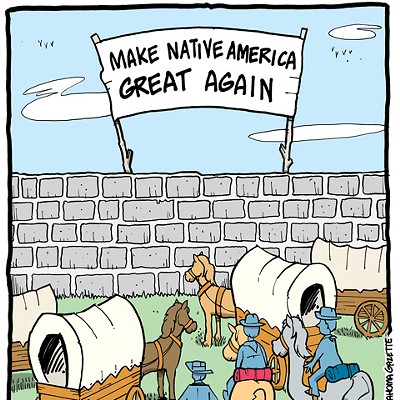In November 1972, 82-year-old historian Angie Debo, preaching in her home church in Marshall, took for her topic the "unholy power of what Eisenhower called the 'military industrial complex.'" According to her biography, "Angie Debo: Pioneering Historian," by Shirley A. Leckie, despite 30 years serving as a lay minister, that particular sermon did not go over very well.
Debo was angry at the present course of the country " the re-election of Richard Nixon, the continuing war in Vietnam, and what she described as a "denial of fundamental civil liberties." She was so angry she refused to celebrate Thanksgiving. Instead, she worked on her biography of Geronimo.
Debo believed that the historian was morally obligated to fight injustice, not just record it. She did this as an activist, especially for Native Americans. Among her many accomplishments as a social justice crusader was helping to found the American Civil Liberties Union chapter in Oklahoma.
Today, Debo's portrait hangs in the rotunda of the Oklahoma State Capitol, where she is among the select few to receive the honor. Her presence in the Capitol rotunda signals that she is among our greatest citizens " someone who embodies what it means to be an Oklahoman and represents our ideals.
Yet, I'm struck by the profound irony of her presence there. You don't have to be a genius to realize that the ideals she embodied don't seem to matter at all to a handful of the folk working in the building. They pass by her portrait every day, only to carry on work which often runs counter to her hopes and dreams.
And it isn't only Angie Debo. It's all those whose portraits hang in that beautiful space.
Jim Thorpe and Ada Lois Sipuel Fisher fought prejudice and pursued equality. Will Rogers was often skeptical of those in power, mocking their absurdities. He was a common sense populist, angry when government didn't do more to help those in need. It's not difficult to imagine what he and Carl Albert would think of the debate over autistic children and our failure to care for the least of these.
Nor is it difficult to imagine what Sequoyah might have thought of the efforts to impose English as an official language. Surely Robert S. Kerr, who is a reminder of a time when being a devout Southern Baptist meant embracing the goals of the Democratic Party, would be disappointed at seeing how religion is currently used by some politicians in this state.
Given the recent absurdity over The Flaming Lips, the most humorous irony of them all is the presence of Woody Guthrie. Rep. Corey Holland, R-Marlow, was offended at a T-shirt that Michael Ivins wore to the Capitol, which I guess Holland thought promoted Communism. Yet, there, hanging in the rotunda, is a portrait of Woody Guthrie, who was associated with Communist groups. The radical Guthrie believed that the definition of freedom included three square meals a day and a good job at "honest" pay.
There's relief in the realization that long after Holland is forgotten, Guthrie will still be hanging there, along with his fellows, reminding us of the true Oklahoma.
Jones, who holds a doctorate in philosophy from the University of Oklahoma, is pastor of the Cathedral of Hope United Church of Christ in Oklahoma City.












